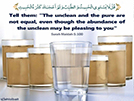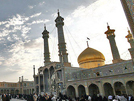Verse153
- Details
- Hits: 2731
(153) يَا أَيُّهَا الَّذِينَ آمَنُواْ اسْتَعِينُواْ بِالصَّبْرِ وَالصَّلوةِ إِنَّ اللّهَ مَعَ الصَّابِرِينَ
153. " O' you who have Faith! seek you help (from Allah) through patience and prayer, verily Allah is with the patient ones (in the time of adversity)."
Commentary :
The phrase / ya'ayyuhalladina'amanu/ " O' you who have Faith! " addresses all those who have Faith entirely, foremost of whom Hadrat Amir-ul-Mu'mineen Ali (a.s.) and the rest of the immaculate Imams are distinguished. This idea is expressed in many Islamic narrations; for instance, it is quoted from Ibn Abbas narrating from the holy Prophet (p.b.u.h.) who said: " No revelation containing ' O' you who have faith' was sent down except that Ali is at its top and is its chief." (1)
Again, it is narrated from 'Akramah who narrates from Ibn-Abbas that has said: " Allah has sent down no verse in the Qur'an consisting of 'O' you who have faith ' but Ali-ibn-Abitalib (a.s.) is the leader of it and the chief of it ".(2)
Of course, the more complete and the higher the degree of Faith is, the content of the verse about it is more clear and more apparent.
(This phrase has also been discussed more comprehensively when commenting on Sura No, 2 verse 104 on pages 250 and 251 in the current volume.)
The phrase / wasta'inu / " seek you help from Allah " is a guiding imperative phrase because at every moment and in all affairs a mortal is in need of Allah's help, whether it is something which is inside his free will, because he is not an absolutely independent subject, though he is created free in will; or it is something which is outside of his will. Man is in complete need of Him (s.w.t.) and he should constantly invocate for everything and seek help from the Lord.
A person most naturally and reasonably can be qualified for the special blessings from God. If this verse is to be taken as referring to the conquest of Mecca, even then it holds good, if it means to say that the people must prove their worthiness or value to the Truth in Islam by bearing the hardest trials with constant prayers to the Lord; for prayer suggests the praying individual's acknowledgment of God's Omnipotence and the individual's confidence in God being the All-Merciful one, as the only One who can grant the prayers of the sincere supplicants.
Real Faith can never be mere empty words. It must express or manifest itself through patience or endurance in all that befalls the individual to show his faithfulness to God, and the help from God must be sought through prayers or supplications to the Lord.
The aid of Allah requires eligibility. This eligibility is confirmed by two things:
The first is having patience in worldly hardships and perseverance in bearing its bitter circumstances. And also having patience in tolerating the hardship of performing Divine services, and obtaining knowledge and good ethics, patience in withholding one's self from lusts and the fleeting pleasure of committing sins and yeilding to low desires, is necessary. This bitterness of hardship, which is short in time, finally results in a sweet fruit which lasts a long time. Concerning the epithets of the true believers, Amir-ul-Mu'mineen Ali (a.s.) has said: " The short period of patience resulted in a long period of tranquility for them." (3)
The term / sabr / ' patience ', in this verse, is rendered into ' fasting ' and 'holy war '.
The second thing is ' prayer ' which is the highest means of turning towards and approaching Allah by which we may seek help and aid from that Origin of favour and Grace.
Some commentators have rendered the term / salat / into ' supplication ' whose explanation demands a separate chapter.
Some others, based on some Islamic traditions, have interpreted it into the ' obligatory prayers ' and ' supererogatory prayers' . For example: it is cited in Tafsir 'Ayyashi narrated from Fudayl from Imam Baqir (a.s.) who said: " O' Fudayl, convey our salam (regards) to our followers whom you visit and tell them I say that I avail you aught (in keeping you far) from the punishment of Allah save by piety. Then, they must control their tongues and be careful of their hands. They should be attentive to patience and prayer. Verily Allah is with the patient ones." (4)
The first part of the verse has also occurred in verse 45, the explanation of which can be referred to on pages 169 and 170.
The objective meaning of the phrase " Allah is with the patient ones" is that His help, assistance, guidance, success, favours, the protection from pests, the perfection of intentions, as well as His other blessings are showered upon the patient by Him.
Above all of the aforementioned bounties, there is the reward of Allah granted to the patient believers in the Hereafter about whom He says: " Those who patiently persevere will truly receive a reward without measure! ", (Sura Az-Zumar, No. 39, verse 13).
(1) Tafsir-i-Furat-ul-Kufi,p.49, Tradition 7
(2) Al-Burhan fi Tafsir-il-Quran , vol.1,p.167
(3) Bihar-ul-Anwar, vol. 68, p.113, Tradition 48
(4) Bihar-ul-Anwar, vol. 82, p. 232











